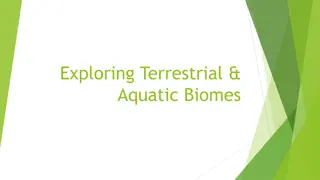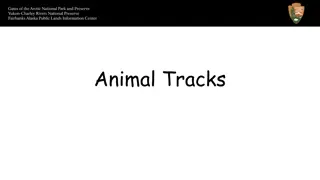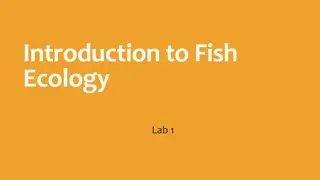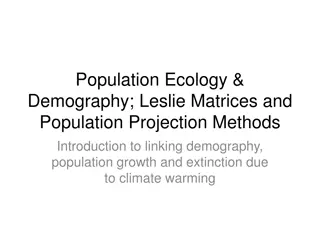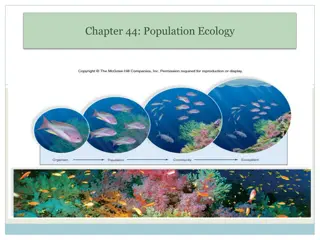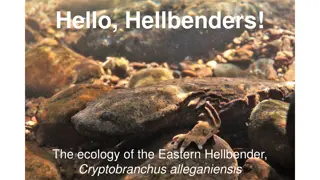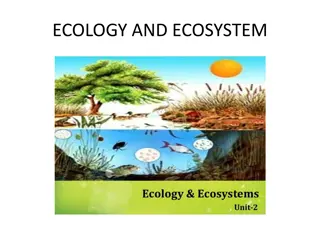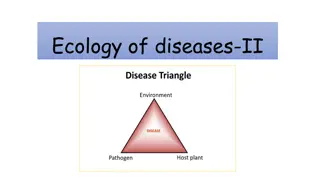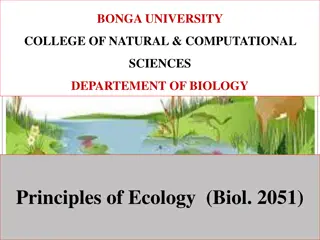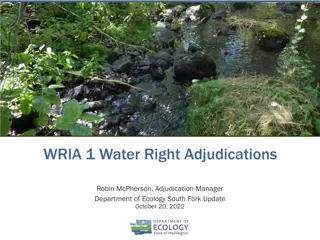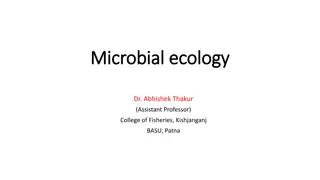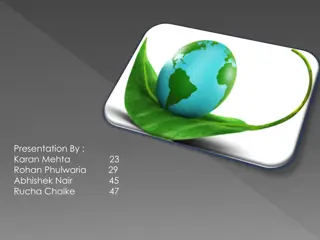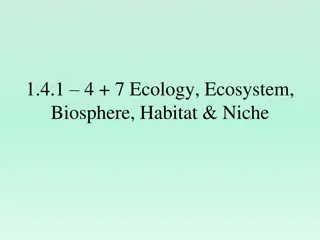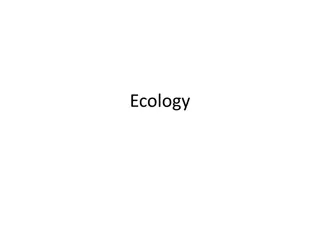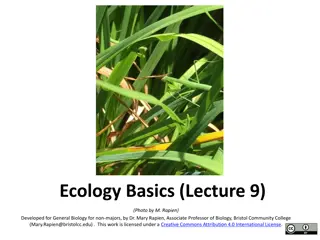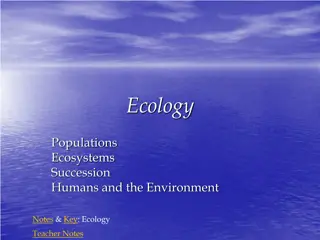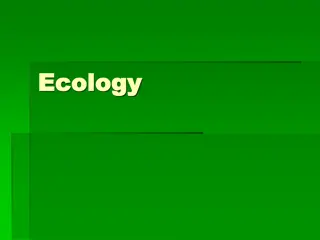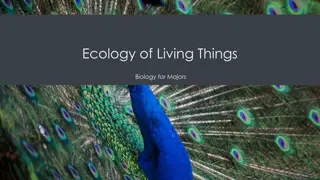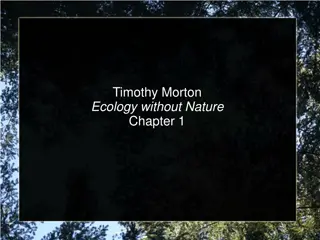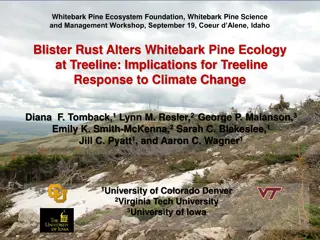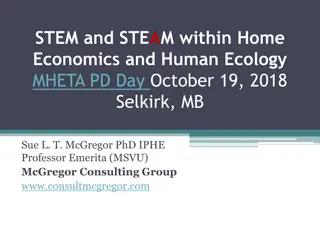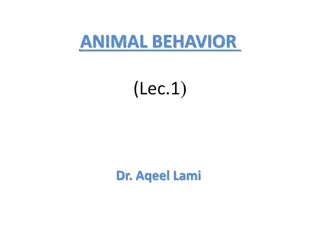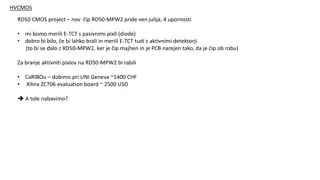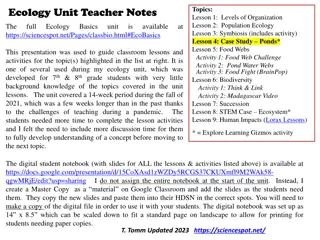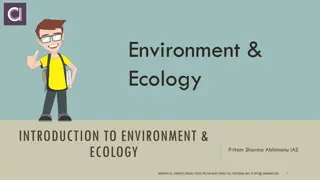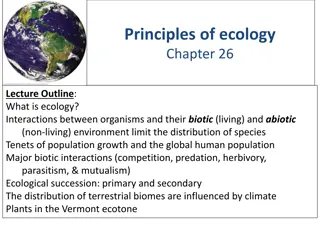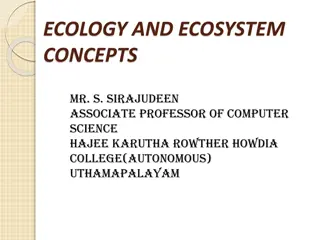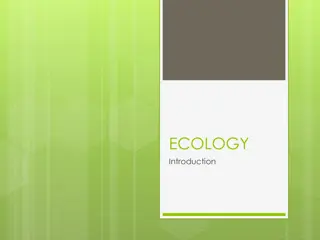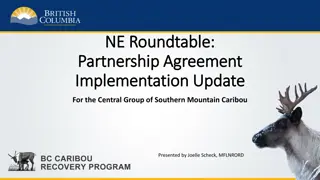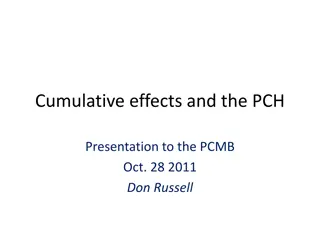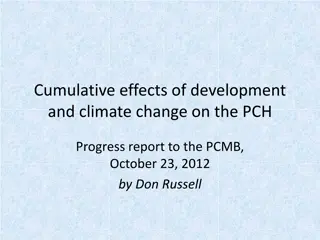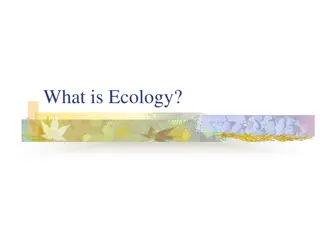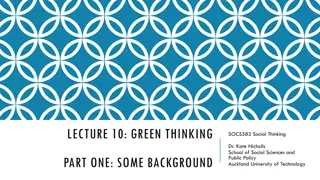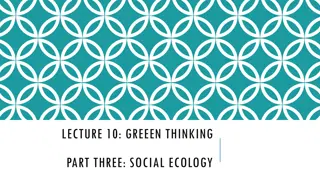Understanding Ecology: Interactions Between Organisms and their Environment
Ecology is the scientific study of how living organisms interact with each other and their environment. It delves into the relationships between biotic and abiotic factors, encompassing topics such as the distribution and abundance of organisms, structural adaptations, behavior under natural conditi
2 views • 42 slides
Understanding Ecosystems: Ecological Interactions and Dependencies
Ecology is the study of how organisms interact with their environment, influencing their distribution and abundance. This exploration covers terrestrial and aquatic biomes, energy flow, environmental impacts, adaptations, and global ecosystems, emphasizing the interconnectedness of all living organi
2 views • 58 slides
Exploring Animal Tracks: A Visual Guide
Discover the fascinating world of animal tracks through detailed images and descriptions. Learn about various tracks left by caribou, sheep, red foxes, gray wolves, squirrels, rabbits, weasels, and more. Find out about the size, movement patterns, and activity times associated with each type of trac
0 views • 7 slides
Understanding Fish Ecology: Interactions, Diversity, and Environmental Factors
Fish ecology involves studying the distribution, interactions, and abundance of fish species in different ecosystems. This lab delves into the divisions of ecology, fish species diversity in marine and freshwater ecosystems, and the environmental factors affecting fish diversity and abundance. Disco
1 views • 7 slides
Understanding Population Ecology and Demography Through Leslie Matrices
Explore the critical aspects of population ecology and demography, focusing on factors influencing abundance, population growth, regulation, and the impacts of climate change. Learn about population projections, growth models, age-structured populations, and data requirements for estimating populati
4 views • 35 slides
Understanding Population Ecology and Growth Patterns
Explore the intricacies of population ecology, demography, distribution patterns, and growth rates in natural populations. Learn about limiting factors, resources, biotic potential, and the concept of carrying capacity. Gain insights into population dynamics and the interplay between organisms and t
1 views • 19 slides
Understanding the Ecology of Eastern Hellbenders
This comprehensive guide explores the ecology of Eastern Hellbenders (Cryptobranchus alleganiensis), discussing the abiotic and biotic factors influencing these fascinating salamanders. Covering topics such as populations, communities, and the essential role of producers, it sheds light on the chall
2 views • 16 slides
Understanding Ecology and Ecosystem: A Comprehensive Overview
Ecology, derived from the Greek word "oikologie," explores the interactions between organisms and their environment. The study encompasses various branches like human ecology, population ecology, and habitat ecology, focusing on the relationships within ecosystems. An ecosystem, defined by A.G. Tans
1 views • 68 slides
Understanding Ecosystems and Disease Ecology
Explore the diverse types of ecosystems, including autochthonous, anthropurgic, and synanthropic ecosystems, and their impact on disease ecology. Learn about biotopes, biocenosis, ecological mosaics, and ecological interfaces, and discover how infectious diseases can be transmitted across these inte
0 views • 10 slides
Understanding Media Ecology: Impact of Communication Technology
Media ecology is a theoretical concept analyzing the influence of media and communication technology on human culture. Neil Postman, a prominent figure in the field, delves into how communication media affect human perception, understanding, and values. This study views media as environments shaping
5 views • 23 slides
Principles of Ecology: Understanding Organism-Environment Interactions
Ecology is the scientific study of how living organisms interact with each other and their environment. It involves understanding organisms at their native habitats, from individuals to ecosystems. The discipline encompasses various branches and focuses on the relationships shaping the distribution
1 views • 14 slides
Understanding Water Right Adjudications in Washington State
Water right adjudications in Washington State, managed by Robin McPherson of the Department of Ecology, aim to regulate water ownership through legal processes. The adjudication recognizes various water users' rights, including federal and tribal, and involves a thorough review of claims by Ecology
1 views • 12 slides
Understanding Microbial Ecology: Interactions and Associations in Ecosystems
Interactions of organisms in ecosystems play a crucial role in the functioning of microbial ecology. Dr. Abhishek Thakur explores symbiosis, mutualism, syntrophism, commensalism, predation, and parasitism, shedding light on how different organisms interact with each other and their physical environm
0 views • 9 slides
Understanding the Relationship Between Ecology and Business
Ecology and business have a complex relationship where human activities impact the ecological environment, and in turn, the environment influences our quality of life. Maintaining ecological balance is crucial for sustainable development, and businesses play a significant role in ensuring environmen
0 views • 19 slides
Understanding Ecology and Ecosystems
Discover the definitions and concepts of ecology, ecosystems, biosphere, habitats, and niches. Learn how living organisms interact with each other and their environment, explore different types of ecosystems, and understand the global ecosystem known as the biosphere.
0 views • 20 slides
Understanding Ecology and Basic Concepts in Environmental Science
Explore the fundamental concepts of ecology and environmental science, including species, habitat, population, community, autotrophs, heterotrophs, environment components, food chains, and trophic levels. Learn about the intricate relationships between living organisms and their surroundings in this
0 views • 35 slides
Understanding Ecology: Ecosystems, Biodiversity, and Energy Flow
Explore the intricate world of ecology through topics such as ecosystems, biodiversity, energy flow, and nutrient cycling. Delve into the concept of niches, biodiversity levels, and the importance of energy flow and materials cycling in sustaining ecosystems. Learn about the nitrogen and carbon cycl
1 views • 18 slides
Understanding Ecology: Populations, Ecosystems, and Relationships
Explore key concepts in ecology including populations, population size and density, dispersion patterns, population growth, habitat and niche relationships, symbiosis, ecosystem energy flow, and roles of producers, consumers, and decomposers.
1 views • 27 slides
Understanding Ecology: Interactions in Ecosystems
Explore the intricate web of interactions in ecosystems through the study of ecology. Learn how biotic and abiotic factors shape ecosystems, trace energy flow, and understand nutrient cycles. Discover the importance of biodiversity and the impact of human activities on the biosphere. Dive into topic
0 views • 51 slides
- "Well Water Sampling Procedure and Analysis Options at Caribou Lake Homeowners Meeting
- Learn about the well water sampling procedure, routine test parameters, additional analytes, and the RMB chain of custody form discussed at the Caribou Lake Homeowners Meeting on May 25, 2019. Find out how to collect a bacteria sample effectively, which parameters are optional for testing, and cru
1 views • 18 slides
Understanding Ecology: Interactions in Nature
Ecology entails the study of interactions among organisms and their environment, from the biosphere to ecosystems, populations, communities, and habitats. It includes concepts like competition and limiting factors that impact species survival and population dynamics.
0 views • 30 slides
Exploring Community Ecology: Interactions in Ecosystems
Community ecology, as presented by Mr. Nitin A. Ghorpade, delves into the dynamics of species interactions within ecosystems. It covers concepts like communities, individualistic vs. interactive hypotheses, interspecific interactions, predation, parasitism, plant defenses against herbivores, and mor
0 views • 23 slides
Understanding Ecology: Interactions and Environments in Biology
Ecology is the study of interactions between living organisms and their environment. It involves levels of research such as animal ecology, plant ecology, and more, while also exploring the biosphere's impact, biogeography, species distribution patterns, and energy sources like sunlight. Ocean upwel
1 views • 80 slides
Rethinking Ecology: Nature's Role in Human Society
Timothy Morton's "Ecology without Nature" challenges the traditional concept of "nature" and its interference with ecological progress in society. Through thought-provoking narratives and philosophical perspectives, Morton argues for a reevaluation of our relationship with the environment, emphasizi
3 views • 23 slides
Implications of Whitebark Pine Blister Rust on Treeline Ecology
Blister rust is impacting whitebark pine ecology at treeline locations, affecting community dynamics and response to climate change. Whitebark pine serves as a crucial nurse tree and tree island initiator in Rocky Mountain communities. The decline in whitebark pine due to blister rust disrupts its r
1 views • 29 slides
Understanding the Holistic Approach in Home Economics and Human Ecology
Delve into the concepts of STEM and STEAM within Home Economics and Human Ecology to explore the importance of interdisciplinary, integrative, and collaborative approaches. Learn about the holistic perspective, appreciating the difference between monodisciplinarity, multidisciplinarity, and interdis
0 views • 25 slides
Understanding Animal Behavior and Ecology
Animal behavior encompasses a range of activities such as feeding, breeding, and social interactions. Ethology focuses on studying behavior in natural environments, while behavioral ecology examines ecological aspects like predator-prey interactions. Sociobiology delves into the evolution of social
3 views • 5 slides
Advanced Technologies for Particle Detection and Monitoring
Cutting-edge technology such as HVCMOS RD50-CMOS project along with CaRIBOu and Xilinx ZC706 evaluation board are being employed for precise measurements in E-TCT with passive and active pixel detectors. The development of Radiation Monitor Sensor Boards for ITk, involving sensors like RadFETs and d
0 views • 6 slides
Comprehensive Ecology Unit for Middle School Students
Engage 7th & 8th grade students in a 14-week ecology unit covering topics like levels of organization, population ecology, symbiosis, biodiversity, human impacts, and more. Utilize digital notebooks, interactive activities, and exploration tools to enhance learning and understanding. Access resource
0 views • 18 slides
Introduction to Ecology and Environment Studies
Ecology is the study of the relationship between organisms and their environment, while the environment refers to the surroundings that influence living organisms. The biosphere is divided into the atmosphere, lithosphere, and hydrosphere. Terms in ecology include species, populations, communities,
0 views • 13 slides
Exploring Ecology: Interactions, Distribution, and Population Dynamics
Ecology delves into the relationships between organisms and their environment, understanding factors that limit species distribution, major interactions like competition and predation, as well as population growth patterns. This includes the influence of biotic and abiotic factors, ecological succes
0 views • 30 slides
Understanding Ecology: Key Concepts and Types Explained
Ecology, a vital branch of science, delves into the relationships between organisms and their environment. It encompasses biotic and abiotic factors, studying how living and non-living elements interact within ecosystems. Biotic components include living organisms like plants and animals, while abio
0 views • 7 slides
Ecology and Ecosystem Concepts: Understanding Interrelationships in Nature
Ecology explores the interconnections between living organisms and their environment, dating back to zoologist Geoffroy St. Hilaire's early proposal in 1859. The term "ecology" originates from the Greek words for house and discourse, emphasizing the study of organisms within their habitat. Ecosystem
0 views • 36 slides
Exploring Ecology: Interactions and Environments
Dive into the world of ecology, where organisms interact and rely on each other and their surroundings. Understand the concepts of populations, communities, ecosystems, biomes, and the biosphere. Explore the vocabulary of ecology, from individual organisms to entire biomes. Learn about food chains,
0 views • 14 slides
Update on Central Group of Southern Mountain Caribou Partnership Agreement Implementation
The Central Group of Southern Mountain Caribou Partnership Agreement, signed in Feb 2020, is progressing with various committees working on implementing recovery initiatives. Committees such as the Caribou Recovery Committee, Land Use Objectives Working Group, and Snowmobile Advisory Committee are a
0 views • 10 slides
Interactive Model for Climate Change Impact on Caribou Population Dynamics
This content describes the ongoing development of an interactive model to study the cumulative effects of climate change and development on caribou populations. It discusses current progress, model refinements, future tasks, weather handling in the model, and initial condition settings in detail.
0 views • 12 slides
Cumulative Effects of Development and Climate Change on Caribou Population
This progress report by Don Russell on the cumulative effects of development and climate change on the Porcupine Caribou Herd (PCH) discusses findings related to climate analysis, winter range selection behavior, modeling the impacts of climate change and development on caribou body size, energy-pro
0 views • 9 slides
Understanding Ecology: Interactions in the Environment
Ecology, originating from the Greek words "Oikos" and "Logos," is the study of interactions between living and non-living components in the environment. It encompasses the relationships between plants, animals, microorganisms, and abiotic factors like light, water, nutrients, and atmosphere. Studyin
0 views • 16 slides
Exploring Green Thinking: Societal Perspectives on Environment and Ecology
Delve into the realm of green thinking through the eyes of social sciences in this lecture by Dr. Kate Nicholls at Auckland University of Technology. The discourse ranges from traditional Western views on nature to the rise of the green movement, including discussions on deep ecology, social ecology
0 views • 9 slides
Exploring Social Ecology and Anarchism: A Path to Sustainable Future
Social ecology emphasizes the interconnectedness between social issues and environmental problems, advocating for a society without domination or centralized control. Anarchism, often associated with social ecology, critiques hierarchy and promotes cooperation. The affinity between feminism and ecol
0 views • 8 slides

